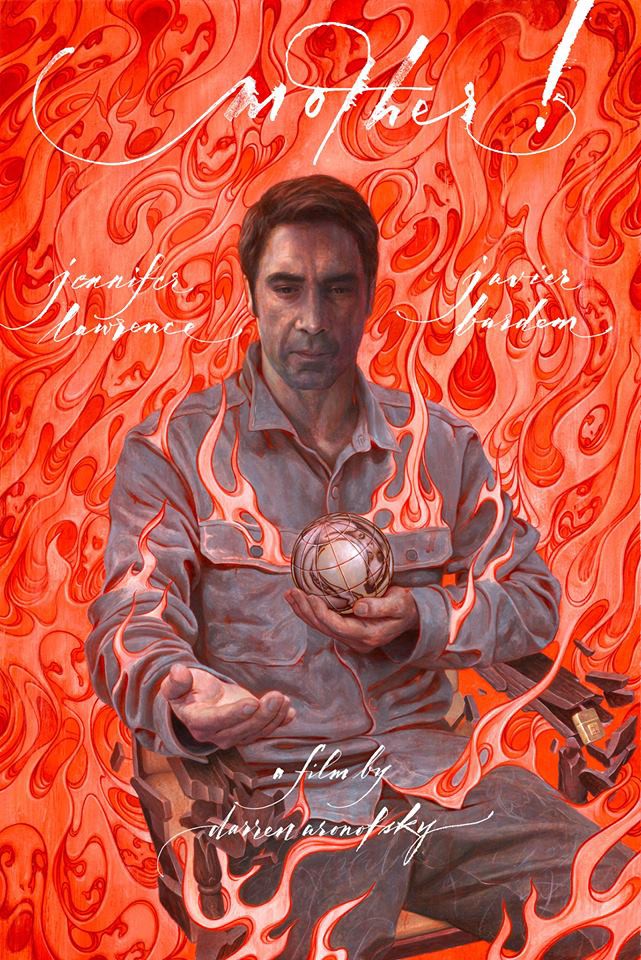Mother!, Darren Aronofsky’s latest film starring Jennifer Lawrence, is excellent filmmaking that may not suit everyone’s taste.

Don’t believe the marketing: mother! is not a straightforward home invasion horror film. It’s directed by Darren Aronofsky, which should be the biggest clue. His past work includes Black Swan (2010) and Requiem for a Dream (2000), two films known for their disturbing psychological examinations of their characters.
mother! starts out as a story-driven vehicle, but the finished result is more of a concept than a conclusive narrative. It’s a work that will not appeal to every audience member, especially those who prefer answers for their art. It’s like examining an abstract painting or sculpture in a museum, enticed by its aesthetics, but feeling on the outside of the artist’s work rather than admitted in.
And that’s exactly where Jennifer Lawrence’s character Mother would like you to stay. In a seemingly endless field, once site to a tragic fire, Mother is trying to create a paradise for her husband, simply known as Him (Javier Bardem). She is trying to recreate his childhood home so that he will have the perfect space to work on his writing. He’s a famed writer who has isolated himself from a world hungry for his next work.
For Mother, he is enough. For Him, his inspiration is stifled in such confinement. So when a man shows up (played by Ed Harris), asking for entry between fits of hacking his lungs, the man and Him immediately bond, much to Mother’s dismay.
Mother is a role unlike any other in Lawrence’s growing formidable arsenal. She’s matured. Mother is perhaps the antithesis to Lawrence’s character Katniss in the Hunger Games franchise, who seemed to bottle up emotion with a swallow and an eye twitch. Here, Lawrence conveys every inner thought and feeling with less dialogue. She guides us through the film with an intimate performance that takes her career to the next level.
For the entire 121-minute runtime, Lawrence is hardly out of the camera’s intrusive frame. The audience is perhaps the only entity aware of Mother and her motivations; the camera revolves around her as she traverses the house, collecting every emotion from in front and watching, almost protectively, from over her shoulder. Lawrence doesn’t waste a second of her time in this role.
Perhaps it’s beneficial that Aronofsky and Lawrence are romantically involved off set, because the movie would have crumbled with an actress less committed to his vision. Aronofsky wrote the script in a feverish weekend locked in his basement, inspired by the world and the state he sees it in. He planned the setting of the house, and every step taken and word spoken inside of it, with laser-like precision.
There’s no music to help set the mood. Lawrence’s short, panicked breath sometimes plays rhythmically in lieu of a tune. Aronofsky masterfully plays with sound, adding the tinkling of a teacup against glass or muffled dialogue off screen to immerse the viewer, as if they, too, were guests in the house hearing something from another room.
But if you’re a guest in this house, you’re not welcome. Shortly after the man arrives, his wife (played by Michelle Pfeiffer) shows up on the porch, suitcase in hand, expecting to be sheltered. She barges in, slinking around the house with hardly an introduction, questioning Mother with a subdued viciousness, like a viper timing its strike. Why doesn’t she have kids with Him yet? Why is she so precise about rebuilding this house? And why won’t Mother let her into his office where he writes?
The man and woman happen to be the earliest guests to the party, and more guests (or intruders) arrive quickly. But, every time you think you know where the movie is going, Aronofsky shoves you down yet another corridor you didn’t know existed. The film coaxes you into building a relationship with Mother and the paradise she is building, but as a guest of the house, there’s a sense of unwelcome that reaches through the screen directly to its audience.
The film is a lit fuse slowly traveling toward the stick of dynamite. You just don’t know what will be left in the remains of the explosion. With cannon fire as ambitious as Aronofsky’s, some are bound to be burned.
It’s a Rubik’s cube of frustration, suspense and intensity that’s rigged to never be solved. A sense of completion would let the audience off too easily. Interpretation is entirely up to the viewer. ••





